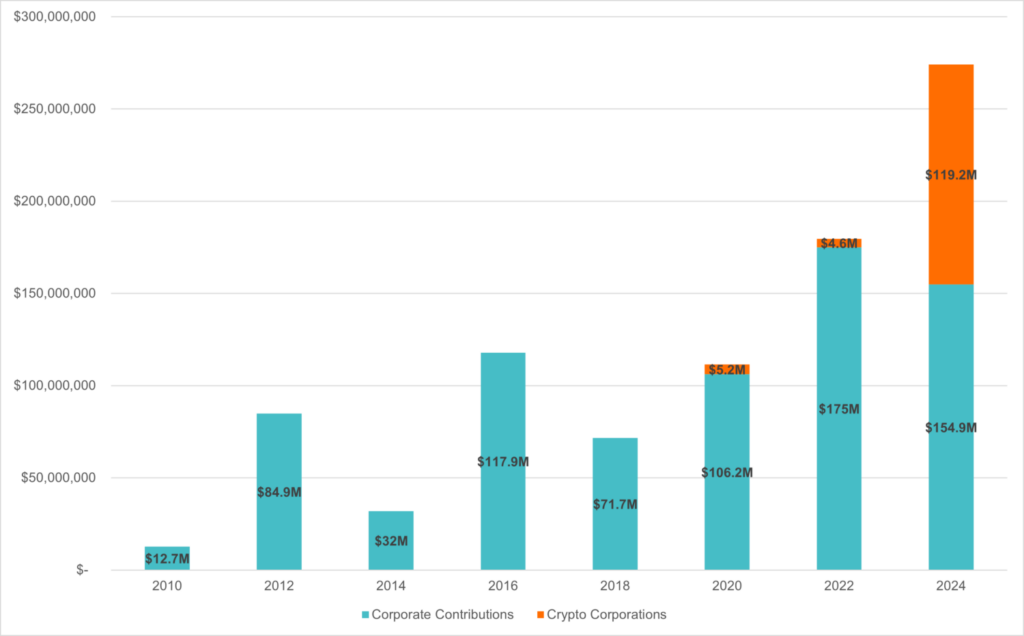What do the Crypto and the U.S. elections have in common? Is the crypto market becoming the new political symbol?
According to Kyle DiPeppe, a crypto analyst, crypto’s prediction market fad has a looming expiration date: Nov. 5, 2024. Election day will bring judgment for hundreds of millions of dollars in bets placed on the U.S. presidential contest and the myriad of other political races that have turned crypto sectors into a massive success. Once these races are decided, so will their prediction markets, leaving their bettors with a win or a loss.
The role of crypto in the U.S Elections
Let’s back up a little. Why is the U.S. politically interested in crypto?
First: The crypto market is a global economic fertilizer. Currently, the total market cap of all crypto combined is $2.5 trillion, of which the U.S. solely contributes $1.19 billion and expects to increase by 12% before 2030.
Like I said in my previous article, crypto might not be controlled, but it can be harnessed, and what better way to speed up economic growth if not via the crypto market?

Second reason: He who controls the people, controls the economy.
Yes, I know crypto can’t be controlled, but guess what? Research data from Fairleigh Dickinson University shows that about one in every seven voters in the U.S. owns cryptocurrency. And most traders are below 40 years of age.
What does this mean? It shows that most crypto traders—and eligible U.S. voters—lack faith in existing political structures. Simply put, they want a new economic ideology that favors them.
According to Coinbase, “Any candidate that wants to win in 2024, especially those running in the battleground states that can make or break federal elections, must account for the young, pro-crypto constituency.”
So, supposing a certain presidential candidate with a sweet tongue and a radical plan offers you—a crypto investor—an offer that softens strict crypto regulations and allows all crypto to thrive. How would you respond?
This leads us to the final reason: crypto donors.

Did you know the crypto industry raised about $119 million to support the U.S. federal elections? It is one of the driving forces behind political campaigns. Surprisingly, this unforeseen cooperation has proven productive, as regulatory bodies like the U.S. SEC have approved some crypto exchanges and cryptocurrencies.
Also, the US elections are partly responsible for causing frequent price increases in the crypto market. Thus enriching the crypto donors.

Trump vs. Harris’ crypto plan: which is better?
The Republican presidential candidate, Trump, has launched a new venture to trade cryptocurrencies.
World Liberty Financial—linked to Trump—is expected to be a borrowing and lending service similar to recently hacked Dough Finance, an app built by four people listed as World Liberty Financial team members, according to crypto news site CoinDesk.
Trump has also talked about subsidizing Bitcoin mining to increase energy production and has vowed to block the creation of a Federal Reserve-administered Central Bank digital currency.
Conversely, Vice President Kamala Harris, the Democratic nominee for president, has signaled that she would back initiatives to help grow the crypto industry—part of a broader intra-party break from hardline skeptics such as Sen. Elizabeth Warren and reluctant critics such as Securities and Exchange Commission Chair Gary Gensler.
The Bottom Line
With the growing popularity of cryptocurrencies among voters, the future administration’s position on digital assets will be crucial, especially in winning over young voters. These topics will undoubtedly be at the forefront of the 2024 election conversation, as 62% of Gen Z and Millennial voters believe cryptocurrency and blockchain technology will revolutionize the United States.
Well, dear reader, November is almost here. and we’ll soon watch our candidates put their strategies to the test. But for now, stay safe, guard your crypto investments, and trade with Jackocoins.
Till next time!
Visits: 4249
